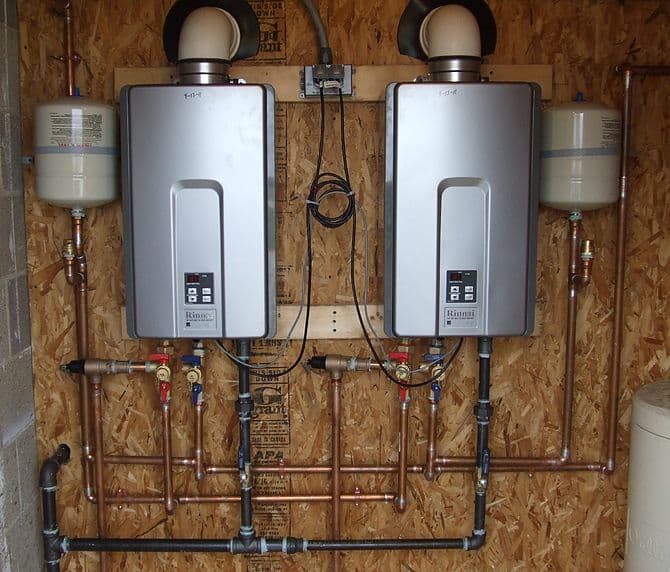
Are you curious about tankless water heaters? Perhaps interested in replacing your hot water tank but wondering, What is the downside of a tankless water heater system? You may have heard some tankless water heater pros and cons: They’re more expensive to buy but cost less to run. That’s all true, but there’s more to tankless water heaters and more to the decision.
Pro: You’ll Never Run Out of Hot Water
The most obvious advantage of the tankless hot water system is that you never run out of hot water. Because it’s heated instantly on-demand, hot water is available whenever you need it. There’s plenty of hot water in the morning for showers, even for a large family. And you can run the dishwasher or do laundry all day—as many loads as needed, with piping hot water every time.
Con: Tankless Heaters Have a Limited Flow Rate
Although you’ll never run out of hot water with a tankless heater, that doesn’t mean they have no limitations at all. The biggest limitation with this system is the flow rate.
Flow rate is typically measured in gallons per minute. For a hot water system, it refers to the number of gallons of water the system can provide in a single minute. In a tankless system, flow rate is determined by two things:
- The particular system you have installed – In a standard tankless system, average flow rate is up to five gallons per minute. Top-of-the-line systems can hit over 10 gallons per minute.
- The temperature setting of your hot water thermostat – The hotter you want your water to be, the lower the flow rate will be, and vice versa.
This means that while everyone in your house can shower one after the other, you can’t necessarily have two or more showers running at the same time, while also running the dishwasher and doing a load of laundry.
Solution: While this can be a problem, it is a solvable one. Tankless heating units are modular, meaning you can install multiple units to handle larger volumes of water. You can even install point-of-use tankless units that heat water exclusively for a single appliance or fixture in your home. By installing multiple tankless units, you can cover your water needs no matter how high they might be.
Pro: Tankless Water Heaters Are More Energy Efficient
With conventional tank-based systems, water is heated in a tank and then stored at temperature indefinitely. This consumes energy whether the water is being used or not, meaning it’s not a very energy-efficient system.
In contrast, tankless heaters only use energy when water is actually heated. There’s no energy used—or wasted—keeping the water hot 24/7. According to the Department of Energy, tankless water heater systems are up to 34% more energy-efficient than tank-based systems.
Another reason tankless water heaters are more energy efficient is that standby losses aren’t an issue. With tank-based systems, standby heat refers to heat energy that’s lost over time, as the water sits in the tank. Since tankless systems don’t require storage of hot water, there’s no standby energy loss.
Con: Tankless Heaters Have a Higher Upfront Cost
Many homeowners are put off by the fact that tankless water heaters are more expensive to buy, install, and maintain. And it’s true: The upfront costs of a tankless system are higher than tank-based systems. You may pay two to three times more for a tankless system, depending on your water needs and the model you choose.
As well as this, if your home isn’t already set up for a tankless system, there might be some additional installation costs to pay. Depending on what your home plumbing system is like, you may need to invest money into upgrading water pipes and electric or gas lines. The good news is, while this does add to the cost, you only need to pay it once.
Pro: You’ll Save Money on Operating Costs

The purchase price of a tankless water heater is more than that of a water tank, but when the energy savings are high enough that the extra expense is recovered over the life of the unit, then converting to tankless is a good option. Since a tankless system is more energy efficient and doesn’t need to be replaced as quickly, the savings cover the cost.
Pro: Tankless Heater Systems Last Longer
A tankless heater isn’t just cheaper to run than a hot water tank; a tankless system also lasts longer than a hot water tank. Hot water tanks last from 8 to 15 years, depending on whether it’s a gas or electric model. Tankless systems can last much longer, as most have an expected lifespan of 20 years or more. In addition, a tankless water heater has parts that can be replaced when they wear out. This makes it possible to extend that lifespan beyond the initial 20 years.
Pro: Tankless Heaters Are the Environmentally Friendly Choice
Tankless water heaters are more energy efficient. The energy you save doesn’t only mean lower operating costs; it also means the carbon footprint of your hot water system is lower.
Pro: Tankless Water Heaters Save Space
Hot water tanks take up a significant amount of space. Switch to a tankless water heater, and you’ll instantly free up that space. This benefit may not be high on the list of tankless water heater pros, but the chance to recoup a little extra storage space in your home is nothing to sneeze at!
Interested in a Tankless Hot Water System for Your Home? Call CW Service Pros
Installing a tankless water heater can bring lots of benefits to your home and your way of life. Once you get used to having unlimited hot water on tap, you’ll wonder how you ever got along without it! To talk about your water heater options or for installation, maintenance, and repair services, call CW Service Pros.

















